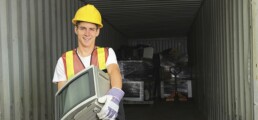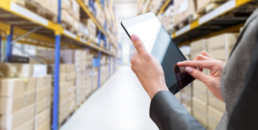Interzero Croatia
Our services
Waste machines
Optimize your work space, reduce logistics costs and create raw materials from your waste.
- Balers and compactors
- Composters
- Smart bins
- Glass crushers
Reduce your waste management costs
Let us take care of your waste management.
- Our employees at the user's location
- Takeaways and consulting
- Purchase of raw materials
- Competent partner with over 30 years of experience
Optimization of packaging
Check if your packaging is recyclable.
- Analysis using the scientific method
- Three years of experience
- Official certificate "Made for recycling"
Latest news
Nothing found.
About us
Employees & Initiatives
Our employees are circular economy experts who make Interzero what it is. Together with them and our partners, we shape a future worth living.
Sabine Nallinger and Markus Müller-Drexel in conversation
In this interview, find out why the European Green Deal is a great opportunity for businesses – and for the circular economy.
Sustainable business
We build bridges, close loops and create added value. The foundations for this are provided by our strategy, which allows us to always focus on the most important.
Studies & Certificates
We put our clients’ contribution to climate protection in black and white: Fraunhofer-Institut UMSICHT regularly calculates the positive ecological effects of this engagement.
Our Solutions
We work to keep raw materials in the loop. For the protection of the environment and the well-being of our clients.
Contact
Sustainability
We build bridges, close loops and create added value. For everyone.
A world without waste – our goal. What is behind it and how do we achieve it? Here’s a first glance through our sustainability strategy.
Contact
Sustainability magazine
We join together to go ALL IN
Sometimes you have to raise the stakes. And this is what we do at Interzero, with our vision of a world without waste.
Sustainability magazine
A world without waste. Our strategy gives us the framework to turn this vision into reality. So we consistently focus on what's important.
You can find all the information about it here
Contact
Regulations
Regulations
We have collected all relevant laws, ordinances, decrees and decisions in one place for you. If you need help interpreting the regulations, feel free to contact us.
LAWS
- Environmental Protection Act
Official Gazette 80/13, 153/13, 78/15, 12/18, 118/18 - Ordinance on waste management
National Gazette 84/21,142/23
RULES
- Ordinance on waste management
Official Gazette 106/22, 138/24
- Ordinance on packaging and waste packaging
Official Gazette 88/15 , 78/16 , 116/17 , 14/20 , 144/20 - Ordinance on batteries and accumulators and waste batteries and accumulators
National Gazette 111/15 - Ordinance on medical waste management
Official Gazette 50/15 , 56/19 - Ordinance on the management of waste tires
National Gazette 113/16 - Ordinance on the management of waste textiles and waste footwear
National Gazette 99/15 - Ordinance on waste oil management
Official Gazette 124/06 , 121/08 , 31/09 , 156/09 , 91/11 , 45/12 , 86/13 - Ordinance on waste vehicle management
Official Gazette 125/15 , 90/16 , 60/18 , 72/18 , 81/20 - Ordinance on waste electrical and electronic equipment management
Official Gazette 42/14 , 48/14 , 107/14 , 139/14 , 11/19 , 07/20 - Ordinance on waste management from titanium dioxide production
National Gazette 117/14 - Ordinance on waste management from the mining industry
Narodne novine 22/19 - Ordinance on management of polychlorinated biphenyls and polychlorinated terphenyls
National Gazette 103/14 - Ordinance on construction waste containing asbestos
National Gazette 69/16 - Ordinance on the catalog of waste
National Gazette 90/15 - Ordinance on by-products and abolition of waste status
National Gazette 117/14 - Ordinance on the register of environmental pollution
National Gazette 03/22 - Ordinance on thermal treatment of waste
National Gazette 75/16 - Ordinance on the conditions for issuing consent to legal entities for the performance of professional environmental protection work
National Gazette 57/10 - Ordinance on disposal of radioactive waste and used sources
Narodne novine 12/18
REGULATIONS
- Regulation on waste management fee and refundable fee
Official Gazette 137/24
- Regulation on municipal waste management
Official Gazette 50/17 , 84/19 - Regulation on the management of waste batteries and accumulators
Official Gazette 105/15 , 57/20 - Regulation on waste vehicle management
National Gazette 112/15 - Regulation on waste packaging management
Official Gazette 97/15 , 07/20 , 140/20 - Regulation on the supervision of cross-border transport of waste
Official Gazette 69/06 , 17/07 , 39/09 - Regulation on liability for environmental damage
Official Gazette 31/17 , 50/20
DECISIONS
- Decision on adoption of the Plan and prevention of food waste in the Republic of Croatia 2019-2022
National Gazette 61/19 - Decision on changes to the regulations in waste vehicle and waste tire management systems
Official Gazette 40/15 , 57/20 - Decision on changing the fee in the waste oil management system
Official Gazette 95/15 , 57/20
Contact
Managing waste documentation - e-ONTO
Management of e-ONTO waste documentation
Interzero Hrvatska offers its clients waste documentation services so that they can deal with their core business unhindered and protect themselves from the possibility of fines from inspections due to incorrect or incomplete documentation.
e-ONTO stands for Record of Origin and Flow of Waste and is used to record waste flows in the territory of the Republic of Croatia. Obligors to keep records through the e-ONTO application are:
- waste sludge producer
- a person who carries out cross-border transport of waste

- waste logistics carrier
- the person who takes possession of the waste
Interzero experts assume your responsibility – they record all the necessary data and keep records up-to-date, accurate and complete , which is the duty of every taxpayer.
We start with creating your user account and continue with all the entries and management of PL-O in the e-ONTO application.
For more information or an offer, contact our experts now!
Contact
Sustainability of Interzero
Sustainability report
Creating sustainable value, protecting the climate and resources, social responsibility: read our current Sustainability Report to see what goals we are striving for and what we have already managed to achieve
Contact
Corporate strategy
Sustainability in focus of corporate strategy
For Interzero, sustainability is the focus of corporate strategy. We take responsibility in all areas of business – for our customers and employees and for the environment and society.
Vision and mission: a future without waste
With our vision of a zero-waste future, guided by our sustainability strategy, we are developing new concepts for a comprehensive circular economy. We always follow our mission: as a leading customer partner in the circular economy, in every industry we close cycles, avoid waste and conserve resources by developing integrated, tailor-made environmental solutions.
Our sustainability strategy: zero-waste solutions
Our current sustainability program for the strategy can be found here:
no waste of ideas
no waste of resources
zero waste solutions

Successful transformation processes thrive on innovation. We test every idea that brings us closer to closed cycles - even at the risk of failure. This is the only way to create the disruptive changes that our linear economic system needs.
We support our clients in professionalising their sustainable practices and integrating sustainability into their reporting processes. For this, we fully exploit the digitalisation potential of our services.
In order to extend the lifespan of products, we develop new markets and expand the business models developed for them in such a way that we realise annual sales growth with them.
Damit Industrie und Handel Ressourcen efficienter als bisher verwenden können, entwinkel wir gemeinsam mit unseren Kunden neue Design-for- Recycling-Ansätze.
Only the use of resources that does not allow any waste is sustainable in our view. That is why we are looking for new ways to close loops every day.
In order to rid the planet of plastic waste in the long term, we are developing new upcycling solutions for plastics every year. We are also increasing the quality and quantities of secondary raw materials that we produce from plastic waste and offer to industry for further processing.
To limit global warming to below 2 degrees, global resource consumption must be decoupled from economic growth. We are thus closing new recycling and logistics loops, which will enable us to generate at least 5 million tonnes of waste per year. Tons of raw materials or 800,000 tonnes of CO 2.
In order to significantly reduce the per capita environmental impact of waste generation, especially in cities, we are committed to waste prevention and a significant increase in recycling rates.
Our employees and their misbehaviour are the core of our competence as an environmental service provider. Making them work at their best for our clients every day requires a consecrated commitment to their health, motivation and development.
We want to promote the physical and mental health of our employees and reduce our sickness, accident and turnover rates to below the industry average. Daupir, we create a safe, value-driven, innovative and developmental working environment.
We want the complete and effective participation of all - regardless of age, gender, origin, religion or social status - to become a reality at all levels of decision-making. Deggle ensures the greatest possible equality of opportunity for all (potential) employees in our company.
The development of a comprehensive circular economy requires that we share our experience and know-how - not only with our customers, but in all areas of the economy and society. This is the only way we can adequately communicate the ecological and economic benefits of efficient recycling management.
We see it as our mission to promote sustainable lifestyles and consumption habits. As an intermediary, we therefore ensure that knowledge about the circular economy is built up in education, politics, business and society.
We want to develop and (internationally) scale cross-sector approaches and standards for circular economy solutions. For this, we work together with our partners, stakeholders, suppliers and customers.
At the same time, we create scope for our employees to participate in appropriate initiatives to develop circular economy solutions.
no waste of talent
no waste of knowledge
Our climate strategy: 50 percent less emissions on site by 2025

Through our services, our customers save greenhouse gas emissions and resources. But our own business activities also produce CO2 emissions. Our goal is to reduce the emissions of harmful gases at the site and thereby contribute to the climate goal agreed at the UN Climate Change Conference 2015 – limiting global warming to well below two degrees. For this purpose, we design our own processes and activities so that they save resources and be as efficient as possible. Based on the calculation of our corporate carbon footprint, we have formulated our climate strategy and concrete goals:
- 50 percent reduction of emissions at the location (Scope 1 and 2) by 2025
- Continuous search for optimization potential in logistics and work towards the goal of reducing the resulting emissions
- Annual savings of at least 5.5 million tons of resources and 800,000 tons of CO2 equivalent through own services
Other pages on this topic
Employees & Initiatives
One Team, One Dream: Together we create a future worth living
Sustainability reporting
Trust through transparency: read all in our sustainability report and magazine
Contact
Depreciation and destruction of goods
Depreciation and destruction of goods
The depreciation of goods for destruction/disposal is a tax-deductible expense (in the sense of profit tax), during which no value added tax obligation arises.
Destruction of confidential documentation/archives
Are you writing off goods that have expired, are no longer in the sales range or did not meet the import requirements ? Goods that are destroyed are properly and ecologically disposed of or recycled, which eliminates the possibility of their return to the market.
From a financial point of view, the write-off of goods for destruction/disposal is a tax-deductible expense (in the sense of profit tax), during which no value-added tax liability arises.
Interzero can help you write off/destroy the following segments of goods:
- Detergents, chemicals
- Adhesives, silicones, paints, varnishes
- Medicines, drug store
- Clothes, shoes
- Food, drink
- Toys
- Consumer goods
- Goods that did not meet the conditions of import
Here are some common methods for destroying such goods:
Burning
Incineration involves burning expired goods at high temperatures. This method is often used for perishable items, drugs and hazardous materials. However, it may not be environmentally friendly and could release pollutants into the atmosphere if not properly controlled.
Postponement
Recycling
In some cases, expired goods can be recycled or repurposed. This is a more sustainable approach that helps reduce waste. For example, expired food products can sometimes be used for composting or turned into animal feed.
Chemical treatment
Donation
Return to manufacturer
Controlled decomposition
Secure destruction services
Regulatory Compliance: Companies and organizations must comply with local, state, and federal regulations regarding the disposal of expired goods, especially hazardous or controlled substances. Compliance with these regulations is essential to avoid legal consequences and environmental damage. It is important to note that the method chosen to dispose of expired goods should prioritize safety, environmental impact and compliance with relevant laws and regulations. In addition, some expired goods, such as certain medicines, may have specific disposal guidelines from regulatory authorities to ensure that they do not harm people or the environment.
Broken, damaged and non-current trade goods

Contact us at otpad@interzero.hr or +385 1 6607 150
Contact
Made for recycling - certificate
MADE FOR RECYCLING - Is your packaging suitable for recycling?
Designing recyclable packaging and avoiding non-recyclable waste is an increasingly important task for retailers, leading brands and packaging manufacturers.
Evaluation of packaging in terms of recyclability
Recyclability refers to the degree to which materials used in the production of products whose life cycle has expired can be returned to the material cycle and thus close the material loop.
In the packaging evaluation process, we check:
- Will the end user (household) know how to properly separate the packaging and put it in the recycling system?
- What are the physical properties of the packaging in order for the sorting system to recognize it and separate it correctly?
- Is there a local infrastructure for recycling this material?
We carry out advanced laboratory measurements, analyzes and ecological diagnostics of processes that enable optimization of product packaging according to EU directives. With the help of a rating scale, we will determine the threshold and target values for the recyclability of your packaging materials.
We will also provide guidance on how to improve or award a certificate for the achieved high level of recyclability of your packaging.
Do you know how recyclable your packaging is?
In cooperation with the German institute Bifa, Interzero has developed the “Made for Recycling” service – a check of the recyclability of packaging based on generally accepted standards developed and approved by independent international institutes. The verification process is simple. Interzero analyzes packaging samples in its Plastics Recycling Competence Center and determines to what extent the packaging can be recycled. Here we use a scoring and evaluation system based on various factors: the size of the packaging, its conductivity, whether the end user will be able to separate it properly, whether there is an infrastructure nearby for recycling used packaging materials, etc. The method is the result of Interzero Group’s own development. After the packaging evaluation process is completed, we draw up a report and issue a certificate of the packaging sampling results. If the level of recyclability of packaging is not sufficient, we also prepare a plan to improve recyclability.
Steps to certification and Made for recycling quality mark:
- You send 5 packing samples.
- Your packaging is tested and analyzed at the Competence Center for Plastics, Maribor, Slovenia.
- You receive a certificate and report on recyclability that contains specific and practical recommendations if further action is required.
- You optimize your packaging.
- We review and analyze your improvements again.

WHY CHOOSE MADE FOR RECYCLING?
High recyclability
Packaging can be recycled well above the minimum legal standard.
Optimal use
They are valuable materials that can be reused in new products and packaging.
Correct waste disposal
The consumer knows how to sort them and throw them away.
More responsibility
You make an important contribution to the promotion of the circular economy.
Efficient sorting
In sorting systems, they are assigned to the right material.

Recyclable ice cream packaging
To secure the best position for circular economy practices, Unilever has put its Cremissimo ice cream packaging under the loop. Laboratory analysis confirmed: Cremissimo packaging is very easy to recycle – for this it received the “Made for Recycling Interseroh” quality mark. The ice cream packaging is made of 100% polyolefin and is designed without barriers that cannot be recycled.
Packaging ready for circular economy
New: chocolate in a paper bag – Ritter Sport’s new “mini bag” is now available in a highly recyclable paper bag that has been awarded the “Made for recycling Interseroh+” mark. With the new “mini bag” Ritter Sport took the first step towards using paper. For this purpose, a newly developed special paper is used, the coating of which does not cause problems in the recycling process.


Cheese in recyclable packaging
Grunlander semi-hard cheese is available in more sustainable packaging from September 2021. It consists of 94% recyclable material and has the “Made for recycling” certificate. The packaging gets the seal only if it can be easily or – as in the case of Grunlander – very easily recycled.
For all questions about the offer, contact our team!













